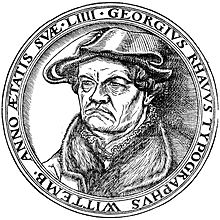Georg Rhau
Georg Rhau (also: Rhaw , * 1488 in Eisfeld ; † August 6, 1548 in Wittenberg ) was a German printer and Thomas Cantor .
Life
Rhau studied since April 15, 1513 philosophy at the University of Wittenberg . Here he acquired the academic degree of a Baccalaureus on June 27, 1514 at the philosophical faculty. In the summer semester of 1518 he moved to the University of Leipzig , where he was accepted as an assessor at the philosophical faculty on September 18, 1518. In addition, he was active from August 1518 as Thomas Cantor. As such, he performed the twelve-part mass Missa de Sancto Spiritu, which he composed, during the Leipzig disputation on June 27, 1519 .
In 1520 he had to leave Leipzig because of his support for the Reformation and was employed as a schoolmaster in Eisleben and later in Hildburghausen . At the end of 1522 he settled in Wittenberg as a printer, later he founded a book printing company, which he ran until his death. The shop was continued by his heirs until 1566. In 1528 he is listed as Thomas organist .
Two music textbooks for school use from 1518 and 1520 as well as ten large collections with works by contemporary composers such as Heinrich Finck , Thomas Stoltzer , Balthasar Resinarius , Simon Cellarius , Sixt Dietrich , Arnold von Bruck and Ludwig Senfl (such as " Symphoniae iucundae atque adeo breves ”, 1538).
The Georg Rhaus music prints are the most important testimony to the musical views and intentions of the circle around Martin Luther .
Revisions
- Music prints from the years 1538 to 1545 in modern musical notation a . a. at Bärenreiter-Verlag .
literature
- Robert Eitner : Rhau, Georg . In: Allgemeine Deutsche Biographie (ADB). Volume 28, Duncker & Humblot, Leipzig 1889, pp. 372-374.
- Johannes Joachim: The printers Johannes Grunenberg and Georg Rhau in Wittenberg. In: Central Journal for Libraries. Volume 21. 1904, pp. 433–439.
- Hans Lülfing : University, printing and book trade in Wittenberg, mainly in the 16th century. In: 450 Years of Martin Luther University Halle Wittenberg Volume 1: Wittenberg 1502-1817. Halle 1952, pp. 377-391, 380.
- Johannes Luther : The Wittenberg printing in its transition to the Reformation press. In: Luther studies on the 400th anniversary of the Reformation ... Weimar 1917, pp. 261–282.
- Stefan Oehmig: 700 years of Wittenberg, city - university - Reformation. Verlag Hermann Böhlaus, Weimar 1995, ISBN 3740009578 .
- Theodor Wohnhaas : Rhau, Georg. In: Biographisch-Bibliographisches Kirchenlexikon (BBKL). Volume 8, Bautz, Herzberg 1994, ISBN 3-88309-053-0 , Sp. 121-122.
- Martin Petzoldt : Die Thomasorganisten zu Leipzig , in: Christian Wolff (Hrsg.): Die Orgeln der Thomaskirche zu Leipzig , Evangelische Verlagsanstalt, Leipzig 2012, pp. 95-137 (p. 95), ISBN 3-374-02300-2 .
- Stefan Oehmig (Ed.): Book printing and book culture in Wittenberg during the Reformation. Vol. 21, Writings of the Luther Memorials Foundation in Saxony-Anhalt, Evangelical Publishing House, Leipzig 2015, ISBN 978-3-374-04078-0 , excerpt [1]
Web links
- Works by and about Georg Rhau in the catalog of the German National Library
- Works by and about Georg Rhau in the German Digital Library
- Sheet music and audio files by Georg Rhau in the International Music Score Library Project
| personal data | |
|---|---|
| SURNAME | Rhau, Georg |
| ALTERNATIVE NAMES | Rhaw, Georg |
| BRIEF DESCRIPTION | German printer and cantor of St. Thomas |
| DATE OF BIRTH | 1488 |
| PLACE OF BIRTH | Ice field |
| DATE OF DEATH | August 6, 1548 |
| Place of death | Wittenberg |
